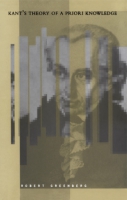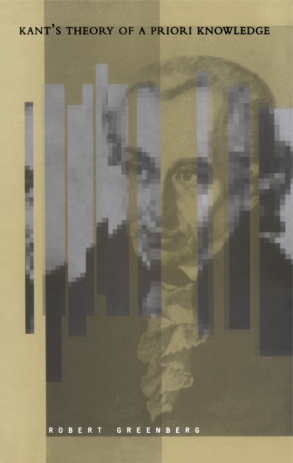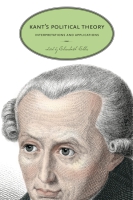Kant's Theory of A Priori Knowledge
Robert Greenberg
“Centering on the notion of ‘things’ simpler (as opposed to either things ‘in themselves’ or objects of experience as such), Greenberg has developed a highly original reading of Kant’s arguments regarding the a priori conditions of knowledge. As a challenge to the main lines of approach to those arguments today, it cannot be ignored.”
- Description
- Reviews
- Bio
- Subjects
Greenberg advances four central theses:(1) the Critique is primarily concerned about the possibility, or relation to objects, of a priori, not empirical knowledge, and Kant’s theory of that possibility is defensible; (2) Kant’s transcendental ontology must be distinct from the conditions of the possibility of a priori knowledge; (3) the functions of judgment, in Kant’s discussion of the Table of Judgments, should be seen according to his transcendental logic as having content, not as being just logical forms of judgment making; (4) Kant’s distinction between and connection of ordering relations (Verhaltnisse) and reference relations (Beziehungen) have to be kept in mind to avoid misunderstanding the Critique.
At every step of the way Greenberg contrasts his view with the major interpretations of Kant by commentators like Henry Allison, Jonathan Bennett, Paul Guyer, and Peter Strawson. Not only does this new approach to Kant present a strong challenge to these dominant interpretations, but by being more true to Kant’s own intent it holds promise for making better sense out of what have been seen as the First Critique’s discordant themes.
“Centering on the notion of ‘things’ simpler (as opposed to either things ‘in themselves’ or objects of experience as such), Greenberg has developed a highly original reading of Kant’s arguments regarding the a priori conditions of knowledge. As a challenge to the main lines of approach to those arguments today, it cannot be ignored.”
“This is one of the deepest and most carefully reasoned books on Kant I have read. It is a book for the scholar of the first Critique, not the ‘educated layman,’ but it very much needs to be read by the former. I repeat: this is a book that needs to be read by any scholar concerned with the problem of a priori knowledge in Kant.”
“Robert Greenberg offers an intricate, highly original reading of Kant’s first Critique on what constitutes the possibility of a priori knowledge. One of the book’s main features, ambitious in scope, is the author’s extensive polemic against mainstream Anglophone approaches to Kant’s position on a priori knowledge.”
Robert Greenberg is Associate Professor of Philosophy at Brandeis University. His articles have appeared in the History of Philosophy Quarterly and the Journal of Philosophy.
Mailing List
Subscribe to our mailing list and be notified about new titles, journals and catalogs.





